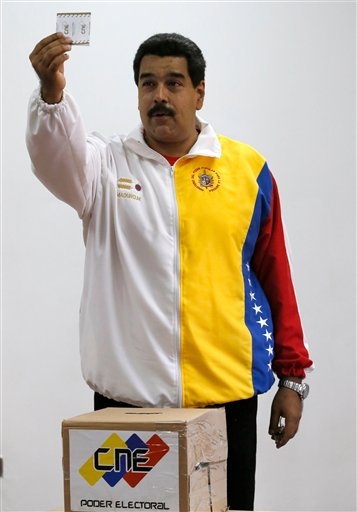
CARACAS, Venezuela (AP) — Pro-government candidates and opponents of President Nicolas Maduro split Venezuela's disputed mayoral elections Sunday, prolonging a political stalemate in the face of mounting economic problems.
Members of Maduro's socialist party were declared victors by the National Electoral Council in 196 of 335 municipalities up for grabs, while the opposition took 53 and independent candidate won eight races. The remaining 78 contests were too close to call.
The opposition, which won 46 municipalities in the 2008 elections, held control of the country's two biggest cities and won at least four state capitals currently in the hands of government supporters, including Barinas, the hometown of the late President Hugo Chavez.
But opposition forces failed to capitalize on discontent with galloping inflation and worsening shortages to win the much-watched national total vote and achieve its goal of punishing Maduro in his first electoral test since he defeated opposition leader Henrique Capriles for the presidency by a razor-thin margin in April.
"The Bolivarian Revolution continues now with more strength," Maduro told supporters at a rally in downtown Caracas to celebrate what he called a "grand victory."
Voting took place in relative calm, with only minor disruptions and isolated acts of violence. At 58 percent, turnout was heavy for local elections though it trailed the 80 percent that cast ballots in April's presidential election, a reflection of fatigue that has set in across Venezuela's political spectrum over the past few months.
It's unclear whether the results will reinforce or slow Maduro's recent tilt to the left.
As Venezuela's economic troubles have deepened, with inflation touching a two-decade high of 54 percent and shortages of everything from toilet paper to milk spreading, disapproval of Maduro's rule has been rising, especially within the coalition of ideological leftists and members of the military that he inherited from Chavez.
But the 51-year-old former bus driver managed to regain momentum by going after groups and businesses he accuses of waging economic war against his socialist government. Among the most popular measures: the seizure of dozens of retailers and the slashing of prices on plasma TVs, refrigerators and other appliances.
Local pollster Luis Vicente Leon said the offensive helped boost president's approval rating from 41 percent in September to just over 50 percent, about the same level of support he garnered in the April election.
While the opposition alliance was never expected to challenge the government's dominance in less dense rural areas, until a month ago it was seen performing better and taking the symbolic national vote by a healthy margin. Instead, it won 41 percent of the national tally, just behind the 44 percent for Maduro's socialist party. The remainder was split among independent parities and dissident factions of Chavismo.
The opposition claimed it was hurt a government-led campaign to intimidate media that provide airtime to its events, as well as abundant, almost-daily coverage of the president inaugurating civil works, handing out homes and announcing raises for state employees.
It was one year ago to the day that Chavez returned to Caracas from Cuba, where he was undergoing cancer treatment, to anoint Maduro as his eventual successor. To commemorate that fateful day, Maduro decreed Sunday a national holiday of "loyalty and love" for Chavez, a move the opposition denounced as an electoral ploy.